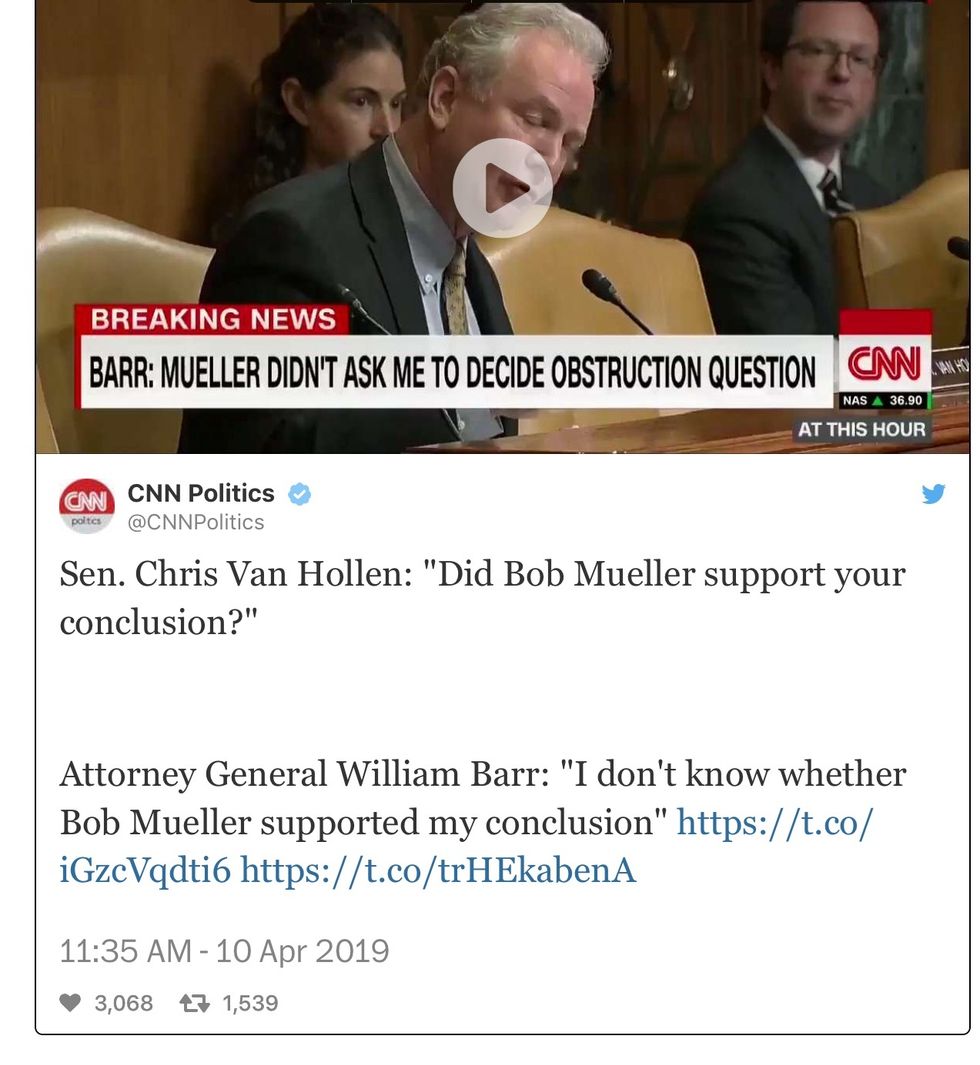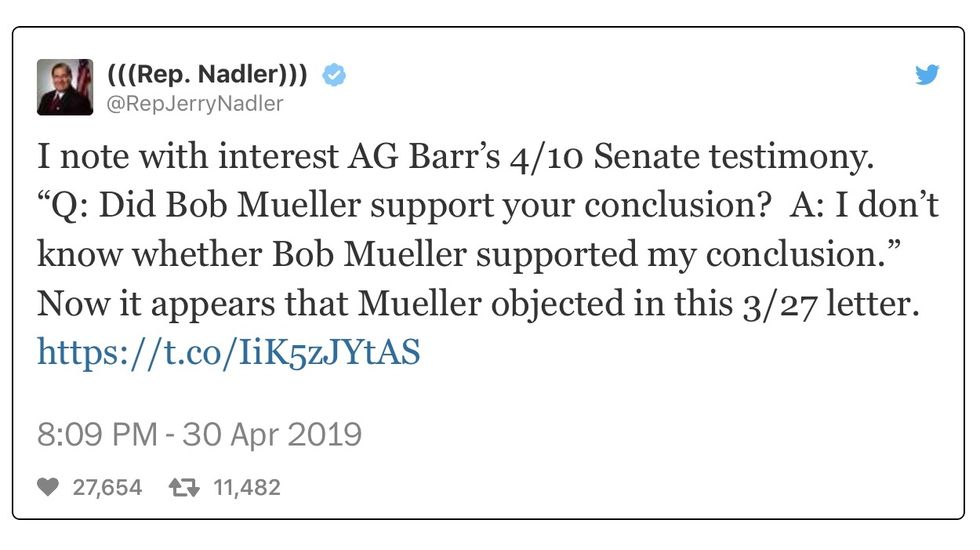In back-to-back congressional hearings on April 9 and 10, Attorney General William P. Barr disclaimed knowledge of the thinking of special counsel Robert S. Mueller III and members of his team of prosecutors investigating Russian interference in the 2016 election.
"No, I don't," Barr said, when asked by Rep. Charlie Crist (D-Fla.) whether he knew what was behind reports that members of Mueller's team were frustrated by the attorney general's summary of their top-level conclusions.
"I don't know," he said the next day, when asked by Sen. Chris Van Hollen (D-Md.) whether Mueller supported his finding that there was not sufficient evidence to conclude that President Trump had obstructed justice.
These statements resurfaced Tuesday following the revelation that Mueller had sent a letter to Barr two weeks earlier objecting to the attorney general's characterization of the probe.
Suggesting that Mueller's letter — only portions of which have been made public — belied the sworn testimony of the attorney general, Van Hollen recirculated a clip of his back-and-forth with Barr and declared, "He must resign."
In an interview with The Washington Post, the Maryland Democrat said he believed Barr's answer was "completely misleading because he was well aware of the fact that Bob Mueller had raised questions with the substance of the conclusions stated in the attorney general's letter."
The Justice Department didn't immediately return a request for comment on Van Hollen's accusation.
In the March 27 letter, Mueller protested that Barr's four-page memo "did not fully capture the context, nature, and substance" of his work, according to a copy reviewed by The Post. In a subsequent phone conversation between Mueller and Barr — longtime colleagues whose differences of opinion about the handling of the Russia probe are beginning to spill into the open — the special counsel expressed concern about public misunderstanding of the obstruction component of the investigation.
According to Justice Department officials, Mueller indicated in the conversation that he did not find fault with the accuracy of the memo but rather with conclusions drawn in media coverage.
Though he had not examined the entire letter, Van Hollen allowed, "Based on what I've seen, it's clear to me that what Attorney General Barr told me is totally inconsistent with what he knew at the time."
He said he hoped his colleagues on the Senate Judiciary Committee, who were preparing to question Barr on Wednesday, would press the attorney general on what he knew about the special counsel's frustrations, and how that knowledge squared with his sworn testimony in early April. Wednesday's hearing will be Barr's first appearance before lawmakers since Mueller's partially redacted report was released on April 18.
In a prepared statement for the committee, Barr defended his handling of the special counsel's investigation.
"As Attorney General, I serve as the chief law-enforcement officer of the United States, and it is my responsibility to ensure that the Department carries out its law-enforcement functions appropriately," he wrote. "The Special Counsel's investigation was no exception."
Democrats view his conduct differently. Central to their objections has been the news conference in which Barr previewed the report's release and echoed the president's defense, saying there was no collusion and no obstruction case that could be prosecuted.
The disclosure of Mueller's March letter provided fresh ammunition.
Van Hollen labeled Barr's profession of ignorance about the special counsel's position "the most recent example of the attorney general acting as the chief propagandist for the Trump administration instead of answering questions in a straightforward and objective manner."
"You now have a pattern of misleading conduct from the attorney general," Van Hollen added. "His bluntly misleading answer to my question is part of that."
Still, the lawmaker stopped short of concluding that Barr had lied to him, saying he needed to review the full letter. And, in a sign of broader reticence among some Democrats about embarking on an impeachment process, he said, "The House has so many questions before it. And they of course have to decide how to prioritize all of the issues facing them."
Rep. Jerrold Nadler (D-N.Y.), who has authority over impeachment questions as chairman of the House Judiciary Committee, also made a point Tuesday night of recalling the exchange between Barr and Van Hollen.
Beyond Capitol Hill, some of the president's critics were quick to conclude that the attorney general should be removed, with some suggesting that he had committed perjury.
At least one presidential candidate, Julián Castro, a former housing secretary for the Obama administration, said the attorney general should step down or face impeachment. A number of prominent figures reached the same verdict. They ranged from Democratic stalwarts, such as former Obama aide Dan Pfeiffer, to disaffected Republican operatives, such as John Weaver, a longtime campaign strategist, including for John Kasich, who was unsuccessful in his bid to deny Trump the Republican nomination in 2016.
Legal experts, however, were skeptical, noting that the uncertainty surrounding the precise objections raised by the special counsel make it difficult to assess Barr's candor. So, too, the ambiguity of the language employed by the attorney general, as well as by the lawmakers questioning him, would likely shield him from a perjury charge, said Jennifer Levinson, a professor at Loyola Law School in Los Angeles. Federal law makes it a criminal offense to speak falsely about a material matter while under oath, and to do so knowingly and willfully.
"He's tiptoeing, dancing and threading the needle all at once around perjury, but I don't think he ever actually steps into the land of perjury," Levinson said. "We're talking about a very skilled attorney who purposely used vague enough language."
Barr's answer to Crist came in a hearing of a House Appropriations subcommittee. The Florida Democrat asked the attorney general about news reports that investigators working on the special counsel's probe were disturbed by his conduct.
"Reports have emerged recently, general, that members of the special counsel's team are frustrated at some level with the limited information included in your March 24th letter, that it does not adequately or accurately necessarily portray the report's findings," he said. "Do you know what they're referencing with that?"
The attorney general said he could only speculate.
"No, I don't," Barr replied. "I think — I think — I suspect that they probably wanted more put out, but in my view, I was not interested in putting out summaries or trying to summarize, because I think any summary, regardless of who prepares it, not only runs the risk of, you know, being underinclusive or overinclusive, but also, you know, would trigger a lot of discussion and analysis that really should await everything coming out at once."
The following day, in a hearing of the Senate Appropriations Committee, Van Hollen asked Barr to explain his finding that there was insufficient evidence to bring obstruction charges against the president — a finding, the lawmaker said, that allowed Trump to claim exoneration.
"It was the conclusion of a number of people, including me and I obviously am the attorney general," Barr said. "It was also the conclusion of Deputy Attorney General Rod Rosenstein." Van Hollen said he understood, and, as Barr pledged to elaborate on his conclusion once the report was released, the senator asked, "Did Bob Mueller support your conclusion?"
Barr was ambiguous, offering, "I don't know whether Bob Mueller supported my conclusion."
Neither does the public. It remains unclear whether Mueller will testify before Congress, and on what terms.
But Van Hollen claims that Barr faced no such uncertainty. "When the attorney general answered that question, he had full knowledge of the letter from Mueller, in which Mueller expressly stated that he did not capture the substance of Mueller's conclusions," the first-term senator said.
Absent a clear legal infraction, the contest over Barr's handling of the special counsel's report will continue to unfold as a pitched partisan battle, said Levinson, the law professor.
The latest revelation, she said, gave Democrats a chance to claim politically popular ground. That would be an unfamiliar scenario, she added, as, "up to now, the attorney general has been very smart at controlling the narrative, dominating the new cycle at the most important moments."
Isaac Stanley-Becker. Washington Post. May 1, 2019.
Devlin Barrett and Matt Zapotosky contributed to this report.
###
May 1, 2019
Voices4America Post Script. With last night's revelation that Mueller wrote a letter (dated March 27) to the Attorney General, objecting to Barr's false summary of his Report (which claimed that Mueller exonerated Trump), this has become shockingly clear: Barr is unfit to be the Attorney General- the lawyer for the American people.
In 2 House hearings, after he received Mueller’s letter and talked with him (April 2 and 3), Barr lied to Congress & to the American people about what he knew about what Mueller thought.
Lying to Congress under oat is a felony. This is a big deal.
Barr needs to be de-barred and removed from office. Enough!
#ImpeachBarr #JailBarr



